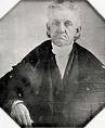The Beecher Family and Homeopathy
December 11, 2007
 The remarkable Beecher
family championed all that was of benefit for the newly emergent
America, and they leave behind them a legacy which can speak for
itself.
The remarkable Beecher
family championed all that was of benefit for the newly emergent
America, and they leave behind them a legacy which can speak for
itself.
The thirteen children of preacher Lyman and Roxanna Foote Beecher, and his second wife Lydia Beals Johnson, were quite extraordinary, each in their own way:
 Catharine Esther Beecher
1800 - 1878**
**** **
Catharine Esther Beecher
1800 - 1878**
**** **
Catharine was the oldest of the Beecher children, and influenced by the Ladies’ Education Society, she became the founder of the Western Female Institute, the Milwaukee Female College (where homeopathic supporter Frances Willard trained), the co-founder of the Hartford Female Seminary, and the founder of women’s colleges in Burlington, Iowa, Quincy, Illinois and Wisconsin. Catharine also founded the American Woman’s Educational Association and the Central Committee for Promoting National Education._ _
a noted educator, renowned for her forthright opinions on women’s education as well as her vehement support of the many benefits of the incorporation of a kindergarten into children’s education.
Catharine was an enthusiastic supporter of calisthenics, developing her own system and decrying the deformation of women’s bodies with corsets, Catharine wrote a book Calithenics Exercises for Home, Schools and Families and she worked with homeopath Diocletian Lewis in this area.
Catharine was a critic of orthodox medical practices and bad diets was a supporter of hydropathy and of Rachel Gleason’s Elmira Water Cure which had attracted over 20,000 people from all over America and incorporated homeopathic treatment. Catharine’s suggested remedies for women’s poor health were dress reform, vigorous exercise and participation in the water cure.
Catharine corresponded with Angelina Grimke Weld regarding abolitionism and women’s rights, and she wrote Calithenics Exercises for Home, Schools and Families, Miss Beecher’s Housekeeper and Healthkeeper, Address to the Christian Women of America and A Treatise on Domestic Economy, A Treatise on Domestic Economy for the Use of Young Ladies at Home _and _Miss Beecher’s Domestic Receipt-Book_._
Catharine never married, and she died at Elmira in 1878.
 Charles Beecher 1815 -
19{::}00 **
**
Charles Beecher 1815 -
19{::}00 **
**
An American minister, composer of religious hymns, and prolific author and abolitionist:
In 1851, he moved east and ministered to the First Free Presbyterian Church in Newark, New Jersey. The church, known as a stronghold of abolitionism, was expelled from the Presbyterian Synod in 1853, and re-organized as a Congregationalist church. Beecher left in 1857 for a pastorate in Georgetown, Massachusetts.
Following the Civil War, he moved to Florida to help his sister Harriet and her husband minister to newly freed slaves. He eventually became Florida’s state superintendent of public instruction from 1871-1873. He finished his ministry as acting pastor in Wysox, Pennsylvania, from 1885-1893. Beecher died in Georgetown, Massachusetts.
 Edward Beecher 1803 -
1895 ** **
Edward Beecher 1803 -
1895 ** **
Edward was pastor to homeopath Mary Ann Bickerdyke
Edward:
became the pastor of Park Street Church in Boston in 1826, and in 1830 he became the first president of Illinois College at Jacksonville. The college grew under his leadership and he remained president for fourteen years.
The reform spirit took hold of Edward and he organized the first anti-slavery society in Illinois. He resigned his presidency in 1844 after financial misfortune; religious controversies and opposition to his anti-slavery beliefs made the offer of the position of pastor of the Salem Street Church in Boston seem very desirable.
He returned to the West in 1855, where he became the pastor of the First Congregational Church of Galesburg, Illinois, where he remained until 1871.
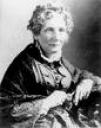 Harriet Beecher Stowe 1811 -
1896** **
Harriet Beecher Stowe 1811 -
1896** **
Harriet Beecher Stowe is a famous author and she was active in the Cleveland lecture circuit and well known for her support of homeopathy, her abolitionist stand and her campaigns for animal rights and women’s rights. Harriet supported Sojourner Truth by writing essays, and Myrtilla Miner (Henry Ward Beecher also assisted her) who devoted her life to educating American Blacks.
Harriet arranged for her father Lyman to have homeopathic treatment, and she describes in her writings the terrible effects of the orthodox medicines of the day which were quite awful and extremely destructive.
Harriet took the Elmira Water Cure with her sister Catharine and with homeopathic supporter Julia Ward Howe in 1846, an occasion which became a ’national social experience’ for radicals and reformers, where Ward Howe ’immortalised’ Harriet’s Battle Hymn of the Republic, which was published by the local Boston firm Ticknor, Reed, and Fields. Her Uncle Tom’s Cabin_ _was published by John P Jewett, and she was close friends with Saran Orne Jewett.
Harriet was also interested in animal rights, writing for the American Humane Education Society and associated with the Vegetarian Society (where she knew Louisa May Alcott’s uncle William).
Harriet’s husband Calvin was an educator and professor of religion and ancient languages. Always supportive of his wife, he found his own literary success in 1868 with his bestseller Origin and History of the Books of the Bible, written at his wife’s prompting.
Harriet was a prolific author and she also wrote _Uncle Tom’s Cabin _which attacked the cruelty of slavery; it reached millions as a novel and play, and became influential, even in Britain. The impact is summed up in a commonly quoted statement apocryphally attributed to Abraham Lincoln. When he met Stowe, it is claimed that he said, “So you’re the little woman who wrote the book that started this great war!”
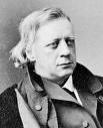 Henry Ward Beecher
1813-1887** **
Henry Ward Beecher
1813-1887** **
The Most Famous Man in America, Henry was America’s best-known and most popular preacher. Henry spoke from Henry Bowen’s pulpit and his speeches were published in Bowen’s newspaper, and these two indomitable characters were soon joined by Theodore Tilton, a young journalist, and they soon became known as the Trinity of Plymouth Church.
Henry was also pastor to homeopath Mary Ann Bickerdyke who often spoke in his church, and he campaigned for a homeopathic police surgeon in Brooklyn, and asked to official homeopathic representation in the Board of Health.
Henry joined forces with Elizabeth Cady Stanton and Clemence Lozier to found the New York Medical College for Women, and he assisted the homeopaths there to ward off their persecutors and defend American Black students in the College.
Henry accompanied Clemence Lozier’s neice, Anna Manning, on her graduation ceremony at the College.
Charles Darwin read at Henry’s chapel during his American tour in 1867, where Henry made a favourable impression, as Darwin reports in his letters. Henry was a fervent evolutionist.
Henry’s church often hosted lectures on the ’burning questions’ of the day, including abolitionism, evolutionism, Swedenborgianism, life in the prairies. Henry and William Cullen Bryant both came out in support of homeopath Eliza W Farnham’s brave experiment Life in Prairie Land and of women’s rights, and also of the new medical inventions and phrenology, despite newspaper campaigns against him, and the Cleveland Lecture circuit he supported.
There was a vocal opposition (as always) to the development of this new wave of thinking and the metaphysical new marriage between science and religion. Henry and Tilton were swept up in a ’Great Scandal’, when Henry was accused of adultery, an accusation which of course came to nothing eventually.
Henry Ward Beecher was a patient of homeopath of a Dr Jewett (either John R Jewett or William E Jewett who both practiced locally) and he actively spoke out in support of homeopathy and he fought for the provision of homeopathy in Brooklyn. He spoke out in support of homeopath Elizabeth Cady Stanton, Julia Ward Howe and Lucy Stone, and homeopathic supporters Susan B Anthony and many others, and he became the President of the American Woman Suffrage Association.
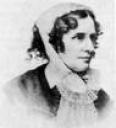 **Isabella Beecher Hooker
1822 - 1907 **
**Isabella Beecher Hooker
1822 - 1907 **
Harriet’s half sister, Isabella also attended the Elmira Water Cure, and she stood with Susan B Anthony, Elizabeth Cady Stanton to address the issue of suffrage before the Judiciary Committee of the U.S. House of Representatives.
Isabella became involved with free love advocate Victoria Woodhull, who would take her to spiritual gatherings where Isabella became convinced she would lead a matriarchal government of the world. She even took the side of Woodhull against her own family. Woodhull posted accusations towards Hooker’s half-brother, Reverend Henry Ward Beecher, accusing him of committing adultery with a woman named Elizabeth Tilton. Isabella was shunned for the rest of her life by much of her family for her actions. She was unwelcome to attend his funeral sixteen years after the publication of the accusations.
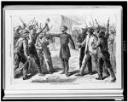 **James Chaplin Beecher 1828 -
1886 **
**James Chaplin Beecher 1828 -
1886 **
James was the only one of Lyman’s sons to serve as a soldier. His military career lasted five years, from June 1861, to June 1866, the last ten months of which he also served as a sub assistant commissioner in the Freedmen’s Bureau.
Edward Augustus Wild was friends with fellow abolitionist and author Harriet Beecher Stowe and enlisted her half-brother, James C. Beecher, as a white officer in one of the new black regiments.
At the same time James commanded the 35th United States Colored Troops, a regiment of freedmen, mostly ex-slaves from North Carolina, one of the first black units to be formed.
Aside from “Beecher’s Bibles,” and “Beecher’s Pets,” nickname of the 1st Long Island Regiment (later the 67th New York Infantry Regiment), in which James spent his first year in the military, the Beecher family’s associations were largely clerical and literary, not military.
Both James and his brother Thomas K. Beecher served for a while as chaplains, but James’s last three years in the army, although he continued to preach wherever he was stationed, were spent as commander of a regiment, and he rose to the rank of brevet brigadier general.
James was glad to leave the chaplaincy behind, was proud of his military career, and tried to re-enlist after his tour ended in 1866. James, like his half-siblings Harriet Beecher Stowe and Henry Ward Beecher, ardently condemned slavery.
A military Beecher in conquered South Carolina at the head of a black regiment was a powerful symbol, perhaps of the same magnitude as Henry Ward Beecher delivering the keynote speech at that supremely triumphant moment, the raising of the U.S. flag over Fort Sumter on April 14, 1865.
James, commander of the northern half of Charleston with his regiment garrisoned in the Citadel, was in the audience. James was a symbol who did not go unnoticed by newly freed slaves and by planters alike. One of the Ball plantations, according to the family’s recent chronicler, Edward Ball, was liberated or “invaded” by James and the 35th USCT. “The Balls must have felt that an ambassador from President Lincoln himself had come to call.” continue reading:
James also enjoyed the Elmira Water Cure. James was placed an an homeopathic Insane Asylum for becoming a hermit and chosing to live alone in quiet contemplation, but his family joined him there, where he was doing charitable works with the local inhabitants. His behaviour was put down to the Beecher eccentricity.
James found an isolated spot and purchased the forest next to a lake he named Beecher Lake, where he built accommodation for his family, and had plans to open a hotel, and his wife opened a school and James began to preach. Eventually, he shot himself.
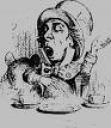 Julia Beecher 1826-1905
Julia Beecher 1826-1905
Julia was married to Thomas Beecher.
Julia was a family friend of the Langdons and Olivia’s (Olivia Clemens - wife of Mark Twain) Sunday school teacher. She was “a renowned beauty and amateur sculpturer” who “bobbed her waist length hair and took to wearing men’s congress boots (heavy working boots).”
Determined to remain her own person despite any outside pressure to conform, Julia also decided that she would dress in terms of comfort, not fashion, and thus happily proceeded to free herself from the confines of the corset.
Observing Julia’s courage to be unconventional by Victorian standards and a committed feminist obviously inspired Olivia in numerous ways.
Julia also enjoyed the Elmira Water Cure and was very enthusiastic about it.
Julia made dolls which Mark Twain auctioned off for charity, calling them ‘jabberwocks’ after Lewis Carroll.
 Louisa Isabelle Beecher
Louisa Isabelle Beecher
Louisa was married to William Estabrook Chancellor, a Professor of Political Science disgraced for suggesting that homeopathic supporter Warren G Harding was of mixed race, which coming from a family of staunch abolitionists may well have been an attempt to prove a point for Black Americans which backfired.
Lyman attended Yale, graduating in
- He spent 1798 in Yale Divinity School under the tutelage of his mentor Timothy Dwight, and was ordained a year later, in 1799.
He began his religious career in Long Island. He gained popular recognition in 1806, after giving a sermon concerning the duel between Alexander Hamilton and Aaron Burr.
A controversial man throughout his life:
Beecher became pastor of the Second Presbyterian Church of Cincinnati (today, this congregation is Covenant First Presbyterian Church), and the first president of Lane Theological Seminary where his mission was to train ministers to win the West for Protestantism.
Beecher’s term at the school came at a time when a number of burning issues, particularly slavery, threatened to divide the Presbyterian Church, the state of Ohio, and the nation.
In 1834, students at the school debated the slavery issue for 18 consecutive nights and many of them chose to adopt the cause of abolitionism. When Beecher opposed their “radical” position and refused to offer classes to African-Americans, a group of about 50 students (who became known as the “Lane Rebels”) left the Seminary for Oberlin College.
The events sparked a growing national discussion of abolition that contributed to the beginning of the Civil War.
 Mary Foote Beecher 1805 - 1900
Mary Foote Beecher 1805 - 1900
Mary was the only purely private Beecher. Since she wanted to do something, she resolved to live to be 100. Writes Author Stowe of his Grand-Aunt Mary: “I remember when the old lady was in training for this century run, one was allowed to talk with her only for five minutes. Her attendant watched the clock.” Born in 1805, Mrs. Perkins undershot her goal by five years.
 R Beecher
R Beecher
R. Beecher is a homeopathic physician of prominence residing in the town of Shelton, Buffalo county. His father, Augustus B. Beecher was a cousin of the eminent divine, Henry Ward Beecher, was a native of Hartford, Connecticut.
 Thomas Kinnicut Beecher
1824 - 1900
Thomas Kinnicut Beecher
1824 - 1900
Thomas came to Elmira to preach. Mr. Beecher had odd little habits and was very unorthodox. He asked to be viewed first as another human being before anything else, in order to eliminate ideas of him being a typical, distant, and arrogant minister.
Taking down these formal barriers between minister and congregation allowed him to become involved in the community more than just one day a week and in areas outside the church. He said, “Preaching never really converts anyone, but living does.”
In an effort to attract more working class males and counter the somewhat common misconception of pastors being weak and effeminate, he organized a campaign that he called “Muscular Christianity.” He played baseball, billiards, and cricket with men in the church and provided them social time in a manly way without going to the tavern. He organized a church baseball team called The Lively Turtles.
On days off, Thomas did various kinds of physical work such as plumbing, carpentry, bricklaying, and watchmaking for people in the community. He also was in charge of running the Elmira town clock for several years. Thomas Beecher kept up his scientific interests with astronomy and by founding an academy of science in Elmira.
Thomas characterized anything that restored one mentally and physically as a form of play. He was very devoted to his church, though he was a different sort of minister with a whimsical personality.
He once said, “I cannot make pastoral calls. I am not constructed so that I can. But I am yours all times of the day and night when you want anything of me. If you are sick and need a watcher, I will watch you. If you are poor and need someone to saw wood for you, I will saw wood for you. I can read the paper for you, if you need anybody to do that. I am yours but you must call upon me, the same as you would a physician.” …
Thomas Beecher was pro-slavery and very open about his views. Even in his close friendship with the staunchly abolitionist Langdon family, he didn’t waver in his pro-slavery opinions and their ties of friendship remained strong in spite of this…
Thomas Beecher was always very outspoken and preached his opinions from the pulpit. He wrote a column in the Elmira Daily Advertiser that he called “Saturday Miscellany,” in which he discussed both religious and secular issues. On Sunday mornings he preached in the Opera House, a location that was not considered proper by many local ministers.
Beecher invited his colleagues to join, but they refused and were angered by him and his impropriety. Still, thousands turned out for Beecher’s Sunday service.
He wrote a book called Our Seven Churches in 1870. The book was about the seven main churches in Elmira that shared common religious views.
Although his sister was Harriet Beecher Stowe the author of Uncle Tom’s Cabin, Beecher was not opposed to the institution of slavery and continued to preach on the subject in church. For some unknown reason people in his church never chastised him even though many of them were abolitionists themselves.
Beecher did help on the Underground Railroad, however, providing counseling for runaway slaves. He was also friends with sexton and runaway slave George Jones and vouched for the honesty of his family. Beecher was willing to help many African Americans on an individual basis…
Thomas ran as the Prohibition Party candidate for the mayor of Elmira in 1884. Thomas’s efforts were directed towards ending alcohol abuse, but not prohibiting alcohol. continue reading:
 William Beecher 1802 -1889
William Beecher 1802 -1889
William was born on January 15, 1802 in East Hampton, New York. He studied at Andover Academy and became a pastor, working in Newport, Rhode Island and Cincinnati.
Marrying in 1832, he had six children with his wife Katharine Edes, who died in 1870. He died in Chicago, Illinois on June 23, 1889.
William was a dyspeptic minister who was called “The Unlucky” because misfortune attended all his ventures. Of his wedding he wrote: “Was married… No company, no cake, no cards - nothing pleasant about it.”
William begat six children. Edward Beecher (1803-95) was for a time president of Illinois College. In a best-selling theological work called The Conflict of Ages he carried on the family trend away from orthodoxy.
Said his father: “Edward, you’ve destroyed the Calvinistic barns, but I hope you don’t delude yourself that the animals are going into your little theological hencoop.” Few theological animals went into the hencoop, which was a theory of the pre-existence of souls.
William was also a pastor
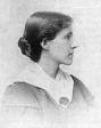 Charlotte Perkins Gilman
1860 - 1935
Charlotte Perkins Gilman
1860 - 1935
Charlotte Perkins Gilman was the niece of Harriet Beecher Stowe. Charlotte wrote the famous feminist short story The Yellow Wallpaper and she was a close friend of homeopathic supporter Mary Wright Sewell.
